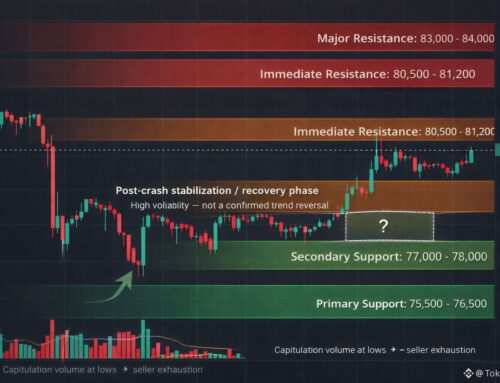Billionaire Jamie Dimon Still Believes America Is Worth Investing In, Despite Trump Tariff
May 22, 2025
On May 19, JPMorgan Chase had an investor-day presentation and billionaire CEO Jamie Dimon had a lot to say about the economy, global trade, and investing. And much of it sounded negative.
During the presentation, Dimon brought up the subject of U.S. stagflation — the dreaded combination of ongoing inflation and economic recession at the same time. Policymakers generally try to keep inflation low and economic growth high. When they intervene, it usually sacrifices one to benefit the other. But when both inflation and growth are moving in the wrong direction, it leaves them with little options to improve the economy.
Dimon also essentially said that U.S. stocks were overvalued and perhaps due for a 10% decline. The billionaire CEO is looking at the market’s valuation compared to its future earnings estimates (known as the forward price-to-earnings ratio), which is already high right now. But Dimon believes economic conditions are deteriorating, partially because of trade tariffs, and that earnings estimates are consequently too optimistic. As estimates come down, the stock market could drop.

Image source: Getty Images.
There was plenty more that Dimon said, and it can certainly sound alarming. But keep in mind that these comments aren’t wildly different from comments that he made just a week ago to Bloomberg. And during that interview, he was undeterred in his belief in the long-term potential of U.S. stocks.
In fact, Dimon said, “If you were to take all of your money and put it in one country, it would still be America.” In light of those comments, here are three of the most resilient publicly traded U.S. stocks there are. All three should be top considerations for 2025, especially if the market does have the 10% pullback that Dimon thinks could happen.
1. A business that prudently invests money
When it comes to the auto parts retail chain space, I’m personally invested in Advance Auto Parts as a (risky) turnaround opportunity. But bigger rival Autozone (AZO -0.30%) needs no turnaround. Even though the S&P 500 index has doubled in the last five years, Autozone stock left the S&P 500 in its dust with a better than 250% five-year return, thanks to its consistently solid execution.
If you’re only looking for top-line growth, Autozone is sure to disappoint — the company finished the first half of its fiscal 2025 on Feb. 15, with first-half net sales only increasing 2% from the same period of its fiscal 2024. But this is a rare case when a stock can perform well without much growth. And it’s thanks to its incredible return on invested capital (ROIC).
The short explanation is that when companies invest money but make back more than they invested, that leads to a positive ROIC. For Autozone, it’s averaged a greater than 50% ROIC over the last decade, which is stellar and lands it among the very best companies in the world.
AZO Return on Invested Capital data by YCharts
In other words, when Autozone spends money to improve its business, it doesn’t mess around. This means that the company is usually cash-rich and it frequently uses this to buy back stock and boost shareholder value. Autozone’s share count is down 28% over the last five years, which plays a big part in its market-beating performance.
With resilient sales, strong ROIC, and a relentless stock buyback program, Autozone is a U.S. stock that can keep climbing for years to come.
2. A trashy business…in a good way
Over the last 10 years, shares of Casella Waste Systems (CWST -1.34%) are up nearly 2,000%, making it one of the very best investments of the past decade. The company has residential and commercial contracts in place to take trash to landfills and recycling facilities. And it has practically zero exposure to anything outside of the U.S.
Regardless of stagflation, tariffs, or downward stock market conditions today, Casella Waste Systems will still be needed to pick up the trash tomorrow morning. The threat of competition in this business is low — players tend to have localized monopolies. And over time, contracts get renegotiated to account for things such as inflation, which sends the top line higher.
One of the benefits of investing in Casella Waste Systems stock instead of some other players in the space is its smaller size. It frequently makes acquisitions, and it doesn’t take much to move the needle.
For example, in October Casella Waste Systems acquired Royal, which was a small player surrounded by Casella in nearby markets. Not only does this help Casella consolidate operations in the region, it added roughly $90 million in annualized revenue. Considering it only has $1.6 billion in trailing-12-month revenue, that’s a small yet still meaningful acquisition.
Casella makes multiple acquisitions like this every year, contributing to its strong long-term stock performance. And I think this is a U.S. stock that can perform well from here.
3. Turning junk into shareholder value
Finally, Copart (CPRT -0.96%) is one of the best U.S. businesses that most people have never heard of. It’s not an exclusively American business — 18% of its fiscal 2024 revenue was generated in international markets. But most revenue is from the U.S. and it’s headquartered in Dallas. And more importantly, it’s a consistent business that can stabilize a portfolio in volatile times.
When disaster strikes, Copart works with insurance companies to get vehicles hauled and auctioned off. But in this process, the company has dozens of other services it provides and which pad its profit margins. The first half of its fiscal 2025 ended on Jan. 31 and its net-profit margin for this period was 32% — that’s almost unheard of.
Copart’s growth is slow when merely looking at the number of vehicles that it has. In the second quarter of its fiscal 2025, there was only about an 8% year-over-year increase in units sold. But revenue was up a more robust 14% thanks to the adoption of its other services. For example, its buyers increasingly rely on it for title services, outsourcing a job they had once done in-house. Increased adoption of services such as these can keep driving the top line higher.
In closing, I wouldn’t say that any of these three stocks are necessarily bargains right now — all three trade toward the higher ends of their historical valuations. That said, this is a reliable trio in uncertain times, which counts for something.
If I were looking for the best bargain of the bunch, I’d likely choose Casella Waste Systems over Autozone and Copart. It trades at roughly 4 times sales and only about 10% above its five-year average. That said, I wouldn’t get too caught up with valuation for these three. These businesses have created a lot of shareholder value over the years and will likely continue to do so for investors who hold long enough.
Search
RECENT PRESS RELEASES
Related Post





